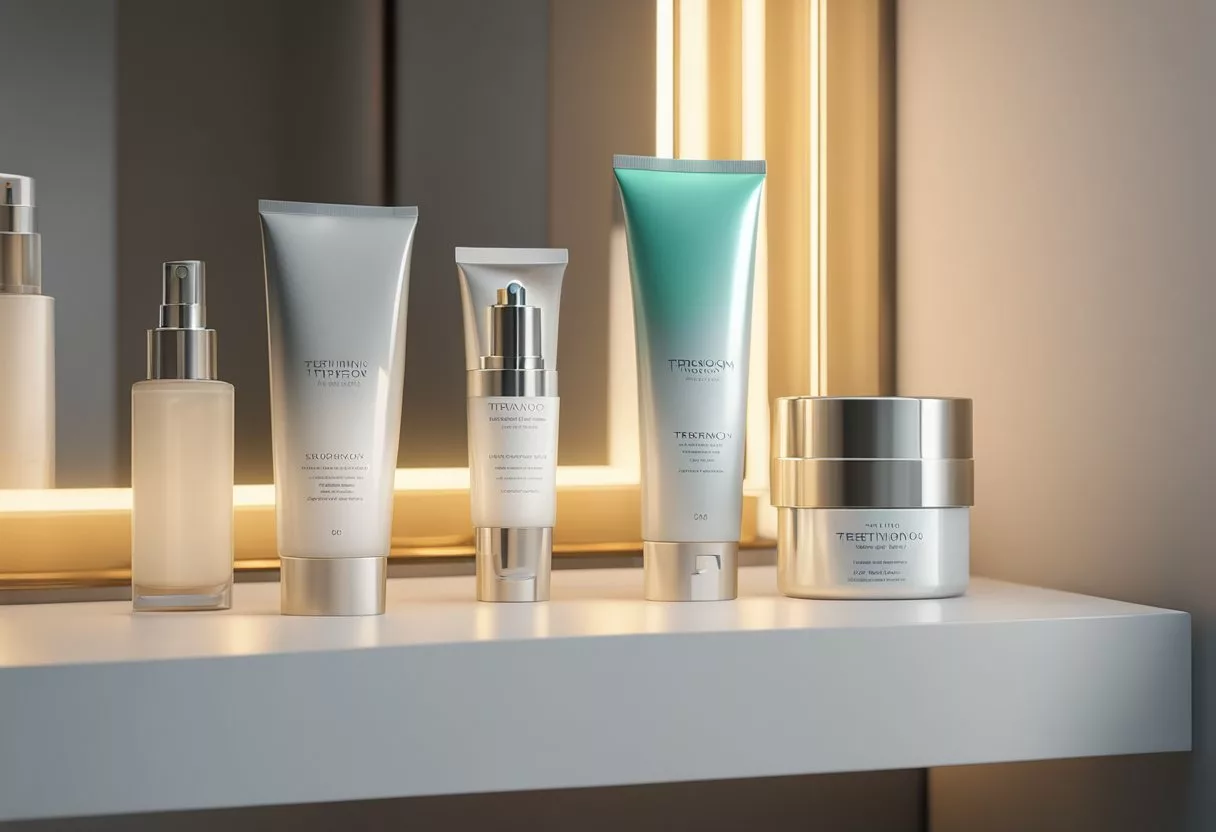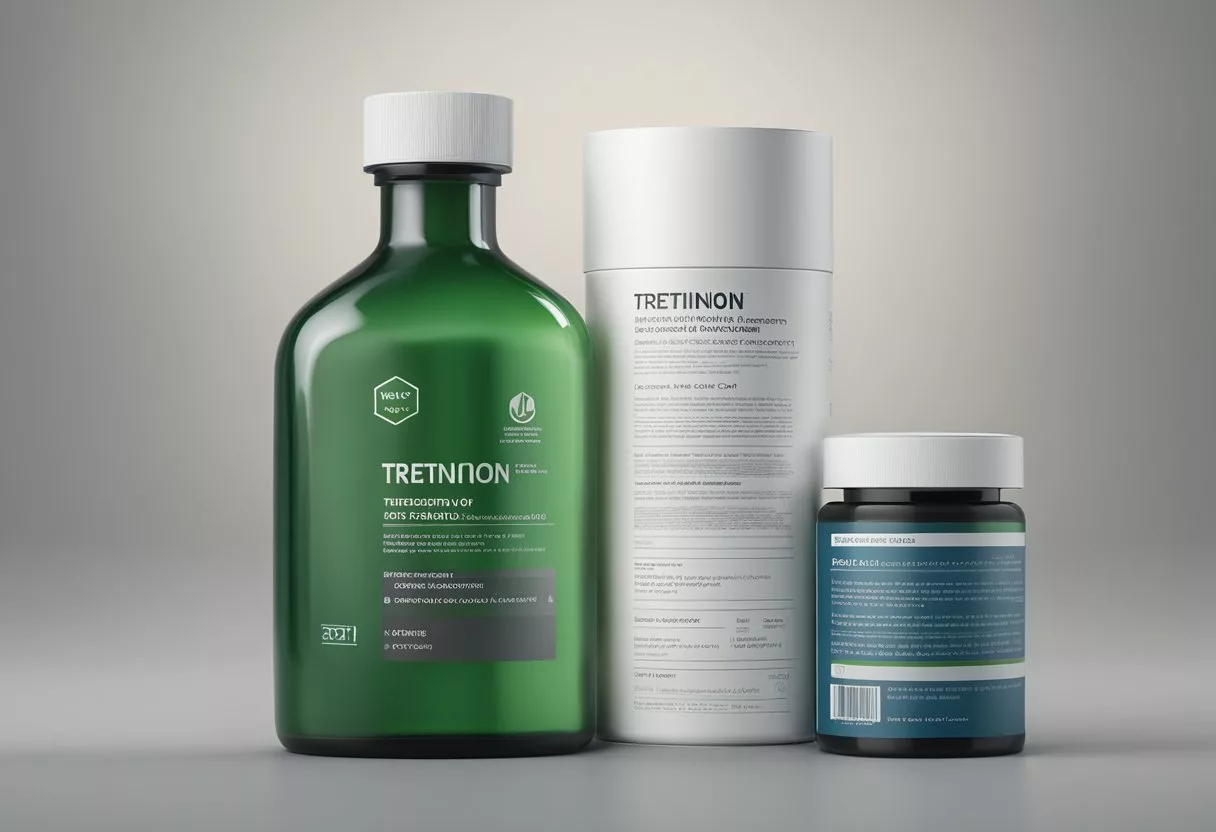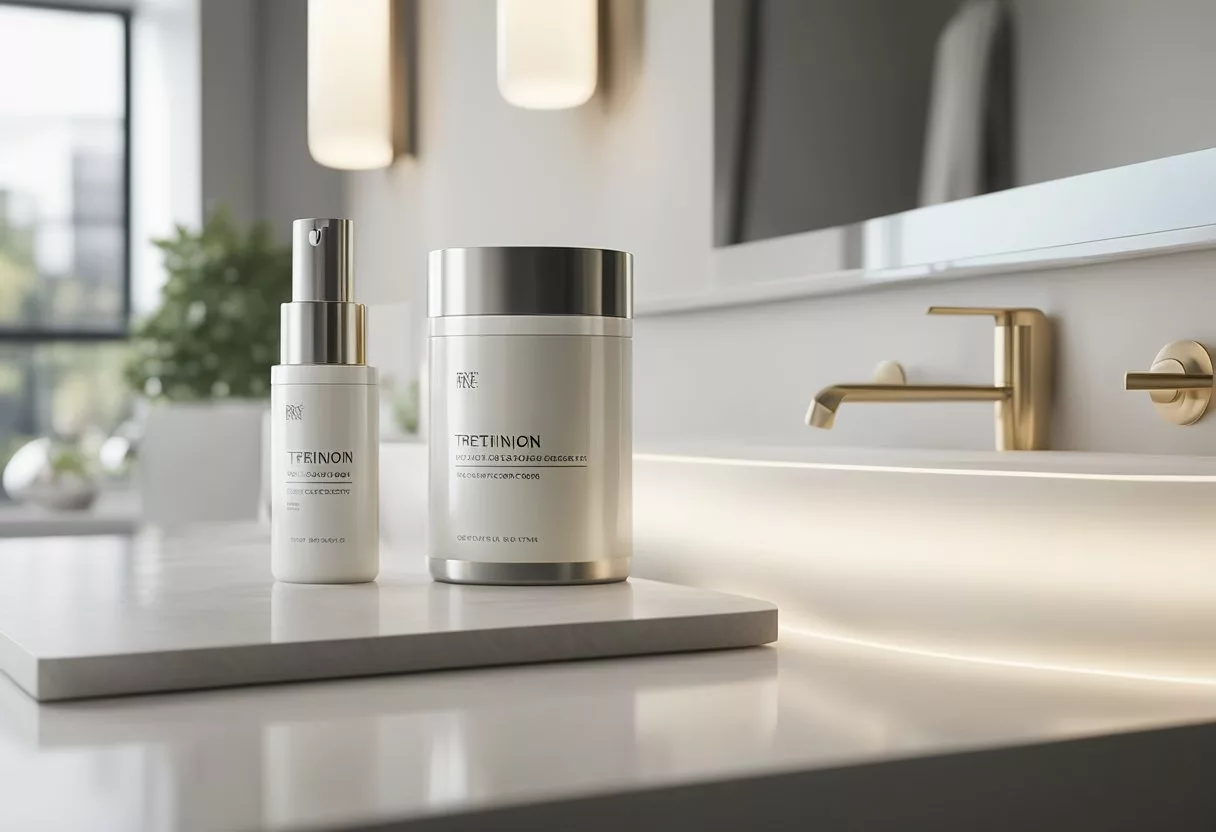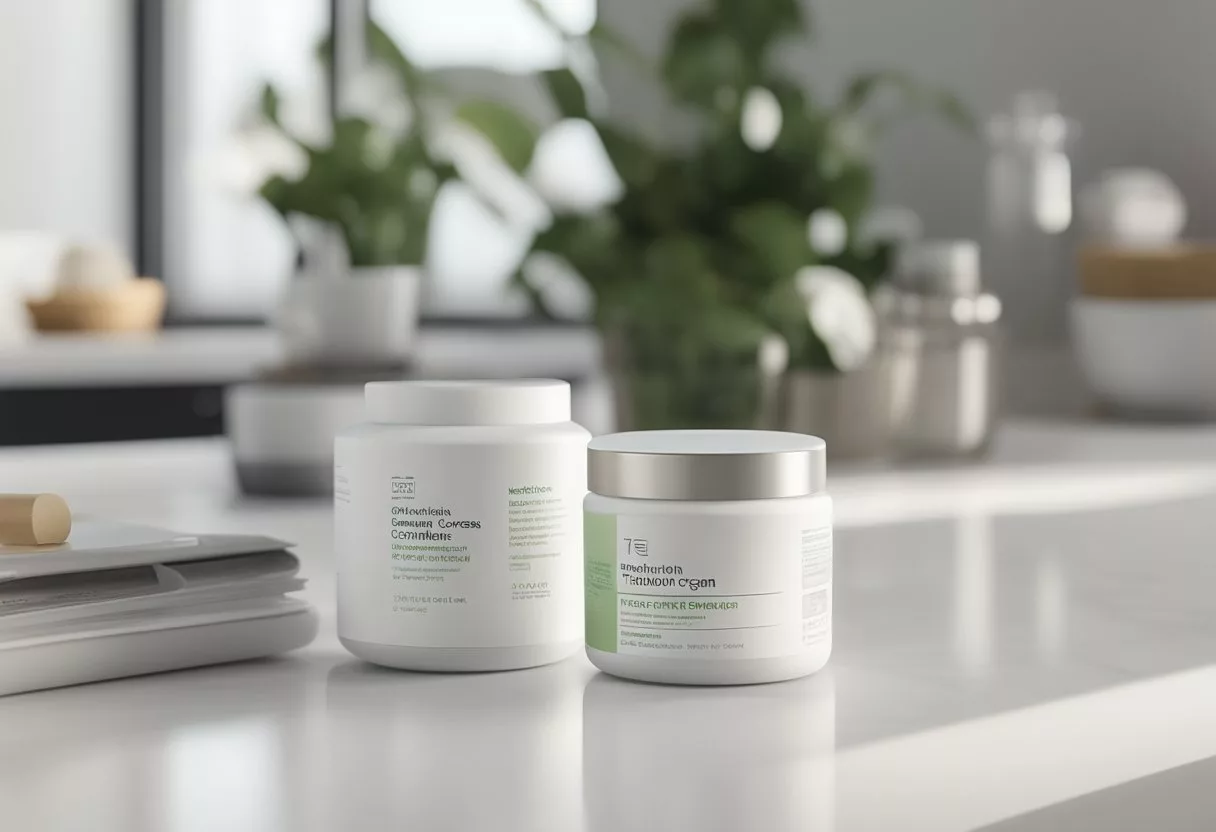Tretinoin is a medication that is commonly used to treat acne and other skin conditions. It is a form of vitamin A and belongs to a class of medications known as retinoids. Tretinoin works by affecting the growth of skin cells, keeping skin pores clear, and lightening the skin. It can help improve the appearance of surface wrinkles, fine lines, and dark spots, but it cannot erase deep wrinkles.

Tretinoin is available in various forms, including creams, gels, and liquids. It is usually applied to the affected area once a day, preferably at night, after washing the face with a mild cleanser. Tretinoin should be used as directed by a healthcare provider and should not be used by pregnant women or nursing mothers.
Key Takeaways
- Tretinoin is a medication used to treat acne and other skin conditions that belongs to a class of medications known as retinoids.
- Tretinoin works by affecting the growth of skin cells, keeping skin pores clear, and lightening the skin.
- Tretinoin is available in various forms, including creams, gels, and liquids, and should be used as directed by a healthcare provider.
What Is Tretinoin?

Tretinoin is a medication that belongs to a class of drugs called retinoids. It is a derivative of vitamin A, specifically retinoic acid, and is used to treat a variety of skin conditions. Tretinoin is available in different forms, including creams, gels, and solutions, and is applied topically to the affected area.
Chemical Composition and Forms
Tretinoin is a yellow to light-orange crystalline powder that is practically insoluble in water. It is available in different strengths, ranging from 0.01% to 0.1%, depending on the condition being treated. Tretinoin is most commonly known by its brand names, Retin-A, Renova, Atralin, Avita, Altreno, and Refissa, but it is also available as a generic medication.
Brand Names and Generic Options
Retin-A is the brand name for tretinoin cream, while Renova is the brand name for tretinoin emollient cream. Atralin is the brand name for tretinoin gel, and Avita is the brand name for tretinoin cream and gel. Altreno is the brand name for tretinoin lotion, and Refissa is the brand name for tretinoin cream.
In addition to these brand names, tretinoin is also available as a generic medication. Generic tretinoin is available in various forms and strengths, and is often less expensive than the brand-name versions. It is important to note that while the generic versions may contain the same active ingredient, they may have different inactive ingredients, which can affect how the medication is absorbed and how well it works.
Overall, tretinoin is a highly effective medication for treating a variety of skin conditions, and is available in different forms and strengths to suit individual needs.
Uses of Tretinoin

Tretinoin is a topical medication that is used to treat a variety of dermatological conditions. The medication is a form of vitamin A and works by promoting the turnover of skin cells, which can help to improve the appearance of fine wrinkles, dark spots, and other skin imperfections.
Acne Treatment
One of the most common uses of tretinoin is for the treatment of acne. The medication works by unclogging pores and reducing inflammation, which can help to reduce the number and severity of pimples, blackheads, and whiteheads. It is often used in combination with other acne medications, such as benzoyl peroxide or antibiotics, for optimal results.
Anti-Aging and Wrinkles
Tretinoin is also used for its anti-aging effects. The medication can help to stimulate collagen production, which can improve the appearance of fine wrinkles and sun-damaged skin. It is important to note that tretinoin cannot erase deep wrinkles, but can help to improve the appearance of surface wrinkles.
Hyperpigmentation and Photoaging
Tretinoin is also effective in treating hyperpigmentation and photoaging. The medication can help to reduce the appearance of dark spots and improve skin texture and tone. It is important to note that tretinoin should be used along with sunscreen to protect the skin from further damage.
Other Dermatological Uses
In addition to its use in treating acne, wrinkles, and hyperpigmentation, tretinoin can also be used to treat other dermatological conditions such as eczema. The medication can help to reduce inflammation and improve skin texture and tone.
Overall, tretinoin is a versatile medication that can be used to treat a variety of dermatological conditions. While it is generally safe and effective, it is important to use the medication as directed and to avoid excessive sun exposure.
Application and Administration

Proper Application Techniques
Tretinoin is applied topically to the skin. The affected area should be cleaned and dried before applying the medication. It is recommended to apply a thin layer of tretinoin cream, gel, or lotion to the affected area once a day, at bedtime. The medication should be gently rubbed into the skin until it is absorbed. It is important to avoid applying tretinoin to areas that are not affected by acne.
Dosing and Frequency
The dosing and frequency of tretinoin application varies depending on the form of the medication. For topical dosage forms such as cream, gel, or liquid, adults should apply the medication to the affected area(s) of the skin once a day, at bedtime. Children should use and dose the medication as determined by their doctor. For topical dosage forms such as lotion, adults and children 9 years of age and older should apply a thin layer to the affected area(s) of the skin once a day.
Missed Dose Guidelines
If a dose of tretinoin is missed, it should be applied as soon as possible. However, if it is almost time for the next dose, the missed dose should be skipped and the regular dosing schedule should be resumed. It is important to avoid applying extra medication to make up for the missed dose.
Overall, tretinoin is an effective medication for the treatment of acne. Proper dosing and administration of the medication is important to ensure its effectiveness and to avoid potential side effects. It is important to follow the application instructions provided by a healthcare professional and to consult with a healthcare professional if any questions or concerns arise regarding the use of tretinoin.
Side Effects and Precautions

Tretinoin is a topical medication used to treat acne, fine wrinkles, and dark spots. While it is generally considered safe, there are some possible side effects that patients should be aware of. This section will discuss the common side effects, serious adverse reactions, and precautions and contraindications associated with tretinoin.
Common Side Effects
The most common side effects of tretinoin include skin irritation, redness, peeling, pain, dryness, swelling, and blistering. Patients may also experience burning, warmth, stinging, and itching. These side effects are usually mild and go away after a few weeks of treatment. Patients can reduce the severity of these side effects by using oil-based creams or lotions to moisturize the skin.
Serious Adverse Reactions
While rare, there are some serious adverse reactions associated with tretinoin. Patients should seek medical attention immediately if they experience any of the following symptoms:
- Dizziness or lightheadedness
- Nausea or vomiting
- Headache
- Depression or mood changes
- Allergic reactions such as hives, itching, or swelling of the face, lips, tongue, or throat
In some cases, tretinoin can cause eczema or make existing eczema worse. Patients with a history of eczema should use tretinoin with caution and consult their healthcare provider if they experience any skin irritation or redness.
Precautions and Contraindications
Patients should take certain precautions when using tretinoin. It is important to avoid excessive sun exposure and to use sunscreen with a high SPF to protect the skin. Patients should also avoid using other topical medications or products that may irritate the skin, such as astringents or exfoliants.
Tretinoin is contraindicated in patients who are allergic to tretinoin or any of its ingredients. It should also be used with caution in patients with a history of eczema, as mentioned above. Pregnant women should avoid using tretinoin, as it may cause birth defects. Women who are breastfeeding should also use tretinoin with caution, as it is not known whether the medication passes into breast milk.
In conclusion, tretinoin is a safe and effective medication for treating acne, fine wrinkles, and dark spots. However, patients should be aware of the possible side effects and take certain precautions when using the medication. If patients experience any serious adverse reactions or have any concerns about using tretinoin, they should consult their healthcare provider.
Special Considerations

Use During Pregnancy and Breastfeeding
Tretinoin is classified as a Pregnancy Category C drug. This means that it may be harmful to a developing fetus and should only be used during pregnancy if the potential benefits outweigh the potential risks. Women who are pregnant or planning to become pregnant should discuss the risks and benefits of using tretinoin with their healthcare provider before starting treatment.
It is not known whether tretinoin is excreted in human milk. However, because many drugs are excreted in human milk and because of the potential for serious adverse reactions in nursing infants, women who are breastfeeding should also discuss the risks and benefits of using tretinoin with their healthcare provider before starting treatment.
Pediatric and Elderly Use
The safety and effectiveness of tretinoin in pediatric patients have not been established. Tretinoin should not be used in children under 12 years of age without first consulting with a healthcare provider.
There is no specific information comparing the use of tretinoin in the elderly with use in other age groups. However, elderly patients are more likely to have age-related liver, kidney, or heart problems, which may require caution and an adjustment in the dose for patients receiving tretinoin.
Interactions with Other Medications
Tretinoin may interact with other medications, including isotretinoin, benzoyl peroxide, and clindamycin. Patients should inform their healthcare provider of all medications they are taking, including prescription, over-the-counter, and herbal products, before starting treatment with tretinoin.
Isotretinoin and tretinoin should not be used together due to the potential for increased side effects. Benzoyl peroxide and clindamycin may be used in combination with tretinoin, but patients should follow their healthcare provider’s instructions carefully to avoid skin irritation or other adverse effects.
Overall, patients should always inform their healthcare provider of any medical conditions, medications, or supplements they are taking before starting treatment with tretinoin. This will help ensure that the patient receives the most appropriate treatment and avoid potential adverse effects.
Lifestyle and Environmental Factors

When it comes to maintaining healthy skin, lifestyle and environmental factors play a crucial role. In this section, we will examine the various lifestyle and environmental factors that can affect the efficacy of tretinoin in treating skin conditions.
Sun Exposure and Protection
Exposure to sunlight is one of the most significant environmental factors that can affect the health of the skin. Overexposure to the sun can lead to sunburn, sun-damaged skin, and even skin cancer. It is essential to protect the skin from the harmful effects of the sun by wearing protective clothing, using sunscreen, and avoiding tanning beds.
Skincare Products and Cosmetics
The use of skincare products and cosmetics can also affect the efficacy of tretinoin. Some skincare products can cause irritation or dryness, which can make it difficult for tretinoin to penetrate the skin. It is essential to choose skincare products that are suitable for your skin type and that do not contain harsh chemicals.
Dietary Considerations
Dietary considerations can also play a role in the health of the skin. Consuming a diet rich in fish, for example, can provide the skin with essential nutrients such as omega-3 fatty acids. It is also important to avoid consuming excessive amounts of alcohol, which can dehydrate the skin and cause it to look dull.
In conclusion, lifestyle and environmental factors can have a significant impact on the health of the skin. By taking steps to protect the skin from the harmful effects of the sun, choosing suitable skincare products, and consuming a healthy diet, individuals can help to maximize the efficacy of tretinoin in treating skin conditions.
Additional Information

Overdose and Emergency
If an individual accidentally swallows tretinoin, they should seek medical attention immediately. The symptoms of an overdose may include headache, nausea, vomiting, dizziness, and confusion. In severe cases, an overdose may lead to coma or even death. It is important to keep tretinoin out of the reach of children and pets to prevent accidental ingestion.
Storage and Handling
Tretinoin should be stored at room temperature away from moisture, heat, and light. It should be kept in its original container with the lid tightly closed. If the medication has expired or is no longer needed, it should be disposed of properly according to local regulations.
Patient Education and Support
Patients should follow the instructions provided by their doctor or pharmacist when using tretinoin. It is important to apply the medication only as directed and to avoid getting it in the eyes, mouth, or nose. Patients should also be aware that tretinoin can cause skin irritation, dryness, and peeling, especially during the first few weeks of use.
If a patient experiences severe skin irritation or an allergic reaction, they should stop using the medication and contact their doctor immediately. Patients should also be advised to avoid prolonged exposure to sunlight and to use sunscreen and protective clothing when outdoors.
Patients should be informed that tretinoin is a prescription medication and should only be used under the supervision of a healthcare provider. They should also be instructed to read the prescription label carefully and to ask their doctor or pharmacist if they have any questions or concerns.
In conclusion, tretinoin is a medication used to treat acne and sun-damaged skin. It is important to follow the instructions provided by the doctor or pharmacist when using this medication to avoid any potential side effects. If an individual accidentally ingests tretinoin, they should seek medical attention immediately.
Frequently Asked Questions

What are the primary uses of tretinoin cream?
Tretinoin cream is primarily used to treat acne and reduce the appearance of fine wrinkles and dark spots on the skin. It works by increasing cell turnover and promoting the growth of new skin cells.
Can you describe the side effects associated with tretinoin?
Common side effects of tretinoin cream include redness, dryness, peeling, and itching of the skin. Some people may also experience a temporary increase in acne during the first few weeks of use. In rare cases, tretinoin can cause severe skin irritation and allergic reactions. It is important to follow the instructions of a healthcare provider when using tretinoin cream to minimize the risk of side effects.
How does tretinoin affect the skin?
Tretinoin cream works by increasing cell turnover and promoting the growth of new skin cells. This can help to reduce the appearance of fine wrinkles, dark spots, and acne. Tretinoin cream also helps to unclog pores and prevent the formation of new acne lesions.
Is there a difference in efficacy between tretinoin gel and cream formulations?
Both tretinoin gel and cream formulations are effective at treating acne and reducing the appearance of fine wrinkles and dark spots. However, some people may prefer the gel formulation because it is less likely to cause skin dryness and irritation.
What is the cost range for tretinoin cream?
The cost of tretinoin cream can vary depending on the brand and strength of the product. On average, tretinoin cream can cost between $30 and $100 per tube. Some insurance plans may cover the cost of tretinoin cream, so it is important to check with a healthcare provider or insurance provider to determine the cost of the medication.
Is a prescription required to purchase tretinoin products?
Yes, tretinoin products are only available with a prescription from a healthcare provider. It is important to follow the instructions of a healthcare provider when using tretinoin cream to minimize the risk of side effects and ensure the best possible results.